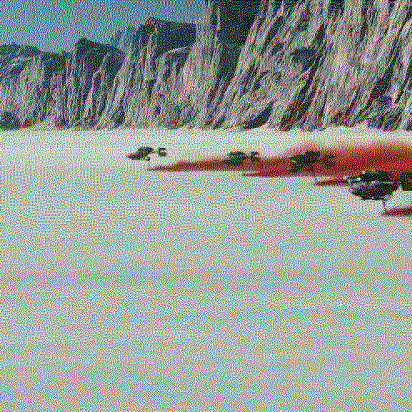
The green saber
Sometimes it seems as if science fiction has encouraged many rich white men to explore extraterrestrial infinity. On the pretext of saving our species or discovering new horizons and new resources, when it might just be a childhood dream... Let's remember what these films really represent... And let's show them a new perspective on their dream, as well as a good reason to fight for our mother ship called Earth.
“What if the Star Wars saga was an invitation to explore our planet rather than the entire galaxy?”
Sciences Fiction: realistic speculation about possible future events, based solidly on adequate knowledge of the real world, past and present, and on a thorough understanding of the nature and significance of the scientific method. Robert A. Heinlein
In science fiction, things are often studied to be plausible on the basis of what exists on our planet (think of the materials, technologies and science that apply on our planet that also apply in this kind of story). They use what we know today to imagine what the future might be like. Take the example of cloning, holograms or space travel, it's easy to fall into the trap of thinking that if the recipe for these new technologies exists and we see them demonstrated in films, then they must be possible in real life, and we must do everything we can to make them happen. So much so that we're even thinking that we need to go and explore the galaxy NOW... Perhaps it's worth taking a second and asking ourselves if these things are even important to us as a society? Although the genre is based on our reality and projects the future, the environment of these fictions is often used to tell stories and problems that are happening here and now. The technologies presented often look like magic and are very tempting, but let's keep them at the level of imagination and fantasy, and take a step back to realize what is essential to our lives and our communities, let's have a more collective vision.
Coupled with other devices like the one in the ‘A New Hope’ chapter, where each character is introduced by another we've already met in the film, in a logical cascading order, so we never lose sight of who's who and who's good or bad. When it comes to using the environment to serve the narrative, using Star Wars to illustrate my thoughts is no coincidence: George Lukas uses the fact that Star Wars takes place in the future to help people understand the story better. This keeps people curious while focusing on the main ideas and issues. It's also much easier to make space travel possible from planet to planet, scene to scene, mystery to mystery... Even if they can be hectic, the journeys only last a few moments. Think of Star Wars as a series of ‘road trip’ films where the main characters travel the galaxy in their spaceships, often landing on a beautiful and unique planet where incredible epics unfold. It's all there to give us a sense of travel and wonder at each new landscape or culture discovered on the other side of the universe, although each location is based on an extrapolated attribute of Earth*.
On the other hand, in James Cameron's work, the planet is so new and complex to us that the whole film takes place on a single planet, feeding our curiosity as we discover it, but again, everything is based on earthy material.
Because the planets in the Star Wars universe are so closely inspired by Earth, they are no strangers to catastrophic events such as climate change and ecological disasters. Tatooine is an example of a planet prone to climate change, going from a thriving wilderness to a hostile desert environment. On the other side, we have the Empire, a high culture of humans on the verge of destroying entire planets with their Death Star... This could be compared to the destruction of our own planet by the escalation of ever more powerful and advanced technologies, from space rockets to nuclear bombs, or simply the overuse of certain resources (like concrete for the Empire's buildings and the Empire State building).
Using science fiction it's easy to imagine other worlds and fantasize about another way of life, and that's a good thing. But it might be a good idea to separate fiction from reality a little more, and project ourselves into problems that we are facing as human today. It's sometimes easy to fall into inventions that take us away from what's really important. Perhaps we should be more critical and use films as a means of exploring and questioning future inventions, while at the same time demonstrating societal problems that are sometimes difficult to grasp in any other way.
In Star Wars, the Empire represent a powerful human force seeking destruction, living in outer space like pirates. While the Rebels are a union of different species living in harmony in the woods, using less invasive technologies and led by a protective force.
In the long term, for the survival of our species, we need to explore other places where we can establish life so that our species can perpetuate itself following the collapse of our sun or the explosion of our planet. We have time, and if our species damages the planet as we're currently doing with ours, perhaps we should become extinct for the sake of the other species living on our planet and in the universe. It's a question of putting the steps in the right order and the step we need to face now is sustainability before emigration because our biggest problem right now isn't the sun or aliens, it is us, humans.
*It's not only the locations that are borrowed from our world in Lucas' productions, there are also many creatures created based of species that exist on our planet.
